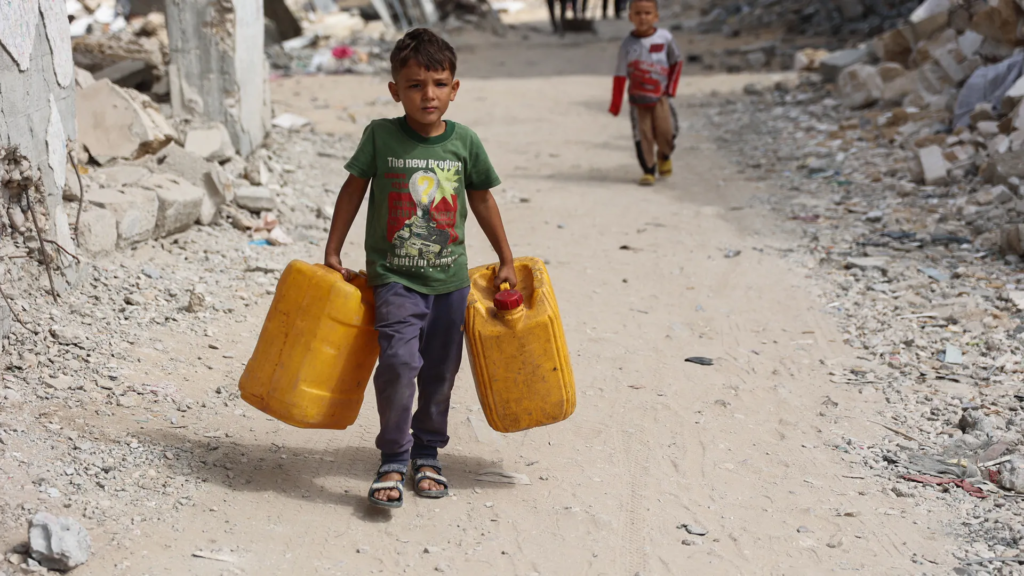The Biden administration has issued a stern warning to Israel, urging it to significantly improve the flow of humanitarian aid into Gaza within the next 30 days or face the potential loss of vital US military aid.
This message comes at a time when the humanitarian crisis in Gaza has reached critical levels, following the intensifying conflict between Israel and Hamas.
As the US continues to provide substantial military assistance to Israel, this ultimatum places unprecedented pressure on the Israeli government to address the growing concerns surrounding the blockade of essential goods and services to Gaza.
Rising Humanitarian Concerns and US Pressure
The conflict between Israel and Hamas has resulted in one of the most severe humanitarian crises in recent memory, particularly affecting the people of Gaza. In response to the Oct. 7, 2023, attacks by Hamas, Israel has launched a series of retaliatory strikes that have resulted in devastating casualties and damage.
According to reports from Gaza’s Health Ministry, nearly 42,000 people have been killed in Gaza since the conflict escalated. This number includes civilians and combatants, though no official distinction is made between the two in Gaza’s count.
Israel’s military operations, aimed at dismantling Hamas, have also taken a significant toll on the civilian population, with countless families facing the consequences of airstrikes, blockades, and an overall lack of essential resources.
Read : Hamas Aerial Chief Behind Paraglider Infiltration in Israel Killed
In an effort to address these concerns, the Biden administration, led by Secretary of State Antony Blinken and Defense Secretary Lloyd Austin, has issued a formal letter to their Israeli counterparts.
Read : Colombia Suspends Coal Exports to Israel Due to War in Gaza
This letter emphasizes the urgent need for Israel to increase the amount of humanitarian aid being allowed into Gaza and to take immediate steps to ensure the safe delivery of that aid.
The US has expressed frustration that despite repeated requests for Israel to scale back its offensive actions and ease the suffering of the civilian population, the situation has continued to deteriorate.
As part of this diplomatic push, the US has set clear conditions that Israel must meet in order to maintain its access to US military funding.

Among these conditions is the requirement that Israel allow at least 350 trucks of humanitarian aid to enter Gaza per day and take additional measures to ensure the safety of humanitarian workers and sites. Israel has been given a 30-day window to respond and implement these changes, or risk losing access to critical US military assistance.
Israel’s Response and the Potential Consequences
Israel, a long-time ally of the United States and the largest recipient of US military aid, faces a delicate balancing act in responding to this ultimatum. While the Israeli government has acknowledged the receipt of the letter from the Biden administration, officials have remained tight-lipped about the specifics of their response.
Israel has continued to defend its military actions in Gaza as necessary for national security, particularly in light of the ongoing threats posed by Hamas and Hezbollah.
However, there are growing concerns both within Israel and internationally that the humanitarian situation in Gaza could spiral out of control if immediate action is not taken.
Aid organizations and the United Nations have sounded alarms over the increasingly dire conditions, with reports indicating that basic necessities such as food, water, and medical supplies are not reaching those who need them most.
According to UN humanitarian officials, the number of aid trucks entering Gaza has reached its lowest point in months, with only about 80 trucks entering through northern crossings since October 1, 2023. This is a sharp decline from the previous rate of approximately 60 trucks per day.
One of the most alarming aspects of the current situation is the possibility that Israel may approve a plan to cut off humanitarian aid to northern Gaza entirely in an effort to weaken Hamas.
Such a move would have catastrophic consequences for the hundreds of thousands of Palestinians who remain trapped in the region, unable to leave their homes or access vital supplies. Humanitarian groups have expressed fears that this strategy could lead to widespread starvation and further civilian suffering.
Despite these challenges, the Israeli government has pushed back against some of the criticisms, with officials from the Coordination of Government Activities in the Territories (COGAT), the Israeli body responsible for facilitating aid crossings, denying reports that access to northern Gaza has been fully closed.
However, the reality on the ground suggests that aid is being restricted in significant ways, contributing to the worsening humanitarian crisis.

For Israel, the stakes are high. Failure to meet the conditions laid out by the Biden administration could jeopardize billions of dollars in US military funding. Since the beginning of the Gaza conflict, the US has provided Israel with a record $17.9 billion in military aid, which has been used to purchase munitions and other military equipment for its operations against Hamas and Hezbollah.
While the US remains a staunch supporter of Israel’s right to defend itself, the Biden administration has made it clear that this support comes with the expectation that Israel will uphold international humanitarian standards and ensure that civilians are not unduly harmed in the process.
The Broader Implications for US-Israel Relations
The ultimatum delivered by the Biden administration represents a significant moment in US-Israel relations, particularly as the 2024 US presidential election approaches. President Joe Biden, who has long emphasized his administration’s unwavering support for Israel, now faces a political challenge as he seeks to balance this commitment with growing pressure to address the humanitarian crisis in Gaza.
Funding for Israel has historically been a highly sensitive issue in US politics, with both Democrats and Republicans expressing strong support for the country. Biden himself has frequently touted the extensive military aid his administration has provided to Israel, going so far as to claim that no previous administration has done more to support Israel’s security.
However, the intensifying humanitarian situation in Gaza has tested this support, with many within the US calling for a more measured approach that prioritizes the protection of civilians and adherence to international law.
The Biden administration’s warning to Israel also reflects broader concerns about the potential for the Gaza conflict to escalate into a wider regional war.
With Hezbollah in Lebanon and other militant groups in the region already engaging in hostilities with Israel, there is a growing fear that the violence could spread, further destabilizing the Middle East. The US has a vested interest in preventing this scenario, not only for the sake of regional stability but also to protect its own strategic interests in the area.

At the same time, the humanitarian crisis in Gaza is having a significant impact on public perception, both in the US and globally. Images of destroyed homes, overcrowded hospitals, and suffering civilians have fueled widespread outrage and condemnation of the ongoing conflict.
Humanitarian organizations have accused Israel of violating international humanitarian law by impeding the delivery of aid and failing to protect civilian populations. The Biden administration’s decision to tie US military aid to improvements in the humanitarian situation reflects a recognition that continued US support for Israel cannot be unconditional.
As the situation in Gaza continues to unfold, the administration will likely face increasing pressure from both domestic and international actors to hold Israel accountable for its actions. At the same time, the US will need to navigate its longstanding relationship with Israel and ensure that any changes in policy do not undermine the broader security partnership between the two nations.
Ultimately, the next 30 days will be critical in determining the future of US-Israel relations and the trajectory of the Gaza conflict. If Israel is able to meet the Biden administration’s demands and improve the flow of humanitarian aid to Gaza, it could help alleviate some of the suffering on the ground and ease tensions between the two allies.
However, failure to do so could lead to a significant reduction in US military assistance, further complicating an already volatile situation.

